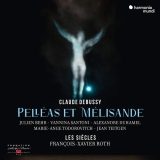Diese Aufführung entstammt einer Produktion der Opéra de Lille und wurde zum Teil dort und im Auditorium La Seine Musicale in Boulogne-Billancourt aufgenommen. Nach der hervorragenden Einspielung von Pierre Dumoussaud und der Oper von Bordeaux (siehe unten) zeichnet sich diese Neuproduktion vor allem durch die historischen Instrumente von Les Siècles aus, die für wunderbare Farben, perfekte Klarheit und größtmögliche Transparenz sorgen. Debussys Orchestersatz hat wohl noch nie so konturiert und nuancenreich geklungen. Roth dirigiert dramatischer, akzentreicher als viele andere Dirigenten und treibt so die Handlung unaufhörlich voran, während man sonst manchmal den Eindruck hat, sie werde immer wieder abgebremst und verfalle in Lethargie.
Einen weiteren markierenden Eindruck hinterlässt Vannina Santoni, deren Mélisande überraschend vital ist. Das ist eine junge Frau, die lebt, handelt, reagiert und sich nicht wie geistesabwesend durch die Oper bewegt.
Julien Behr singt einen jugendlichen, von Liebe getriebenen Pelléas, und Alexandre Duhamel kann mit sicherer Stimme die zwielichtige Figur Golauds gut charakterisieren. Die übrigen Rollen sind einwandfrei besetzt, aber, das muss man noch einmal betonen: unter Roths inspiriertem Dirigat wird auch das Orchester zu einem handelnden Element, welches ständig im sich entwickelnden Drama mit einer nie gehörten Ausdruckspalette einen magischen Stimmungsreichtum entfacht.
This performance comes from a production of the Opéra de Lille and was partly recorded there and at the Auditorium La Seine Musicale in Boulogne-Billancourt. Following the excellent recording by Pierre Dumoussaud and the Bordeaux Opera (see below), this new production is distinguished above all by the period instruments of Les Siècles, which provide wonderful colors, perfect clarity and the greatest possible transparency. Debussy’s orchestral writing has probably never sounded so contoured and nuanced. Roth conducts more dramatically, more accentuated than many other conductors, and thus drives the action ceaselessly forward, whereas otherwise one sometimes has the impression that it is repeatedly slowed down and lapses into lethargy.
Another striking impression is left by Vannina Santoni, whose Mélisande is surprisingly vital. This is a young woman who lives, acts, reacts, and does not move through the opera as if absent-minded.
Julien Behr sings a youthful, love-driven Pelléas, and Alexandre Duhamel does a fine job of characterizing the shady figure of Golaud in a confident voice. The other roles are impeccably cast, but, it bears repeating: under Roth’s inspired conducting, the orchestra also becomes an acting character, constantly sparking a magical richness of mood in the unfolding drama with a range of expression never heard before.






















